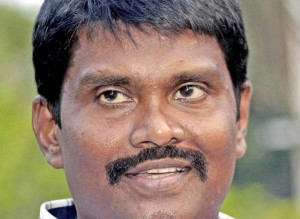Monthly Archives: November 2018
22
21
Ongole’s cricket stadium has scary past!
The city of Ongole, in Prakasam district, is known for a particular breed of oxen. It’s also known for the CSR Sarma College, where Tollywood star Chiranjeevi studied from 1970-72
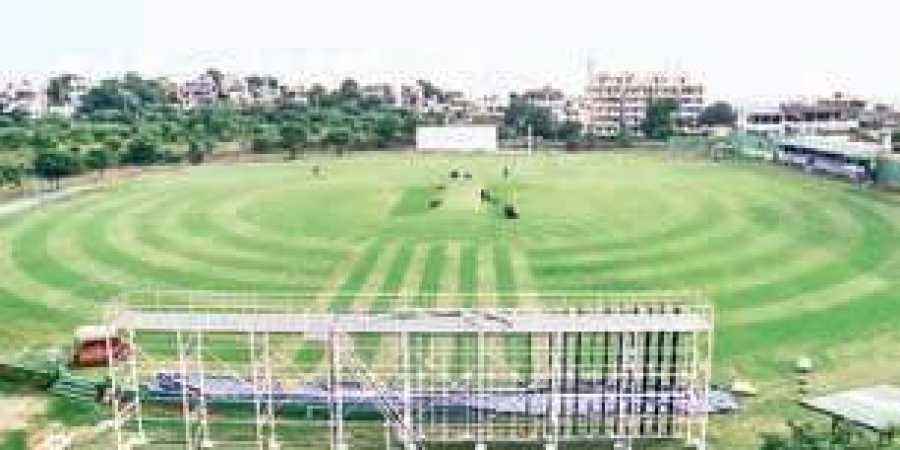
Ongole :
The city of Ongole, in Prakasam district, is known for a particular breed of oxen. It’s also known for the CSR Sarma College, where Tollywood star Chiranjeevi studied from 1970-72. Few know that the cricket ground at CSR Sarma College has a unique history.
It’s perhaps the only cricket ground in India which is built on a burial ground. It was home to venomous snakes and other wild creatures. It was in 2008 when the Prakasam District Cricket Association (PDCA) and the college decided to sign a memorandum of understanding to build a quality stadium, which the city lacked.
“A decade ago, this place was in a totally different state,” says PDCA secretary Pratap Kumar. “It used to be a burial ground and was even named as crime zone. Since 2008, we have been developing it gradually. The ground, with a hillock in the backdrop, had a pond, 15 feet in depth. We dumped almost 16,000 truck loads of soil and renovated a lot to make it look like this.”
Looking like any other cricket venue now, this ground has hosted four Ranji Trophy matches. The fifth, between Andhra and Tamil Nadu, starts on Tuesday. “The eastern side is where we put up chairs. During the last match, crowds turned up in huge numbers to watch Shreyas Iyer and Prithvi Shaw in action. We can expect a sizeable turnout for the Tamil Nadu tie, although it would be more exciting if Dinesh Karthik and R Ashwin were in the team,” said Pratap.
The main objective of the ACA to set up a cricket ground amidst unusual surroundings was to develop cricket at the grassroots. “We saw the potential to have a stadium here. With BCCI’s permission we allowed PDCA to host matches. Our aim is to conduct matches in every district. Wherever there are facilities, we grant them permission to organise first-class matches,” ACA general secretary Arun Kumar said.
With the aim to improving infrastructure, PDCA has arranged a 12-foot sight screen. The ground is equipped with underground cables (both electrical and optical), six cameras for recording the match, two air-conditioned rooms for video analysts, BCCI match referees and scorers.
Conducting matches during rainy season does not pose any hurdle despite the ground lacking an advanced drainage system. “Water drains out automatically. With a low hillock, even if it rains heavily, we can resume the match an hour after rain stops,” explained Pratap.
It was in January 2015 that the ground got the nod to host its maiden Ranji match. The first four-day match saw Andhra taking on Tripura. In four Ranji matches it has hosted till date, the Andhra-Mumbai encounter which took place last November witnessed nearly 7,000 spectators.
source: http://www.newindianexpress.com / The New Indian Express / Home> States> Andhra Pradesh / by Srinidhi PR / Express News Service / November 20t, 2018
Formula 1 on Krishna river kicks off today
Powerboats to zoom at 200 km per hour at Grand Prix of India.
The stage is set for the inauguration of the first international Formula 1 boat races on the waters of the Krishna river at Amaravati.
The 2018 UIM F1H2O World Championship’s six-round powerboat race will start on November 16. The powerboats with a speed of 220 km per hour would compete to win the championship.
Teams from 14 countries are going to participate in the first of its kind international powerboat racing on the Krishna river. The FIH20 is very famous and popular in other countries as 273 grand championships have been held in 32 countries.
Earlier, the FIH20 world championship was conducted in Mumbai in March 2004. This is the second time that the championship would be held in India, at Amaravati and it would be called the Grand Prix of India.
The AP tourism department in association with F1H2O Promoter Manage-ment and India Xtreme Adventure Activities said that the powerboat races would be telecast live in many countries. The tourism department has entered the Amaravati team for the competition from Andhra Pradesh.
Stable waters without waves are required to conduct powerboat races to avoid capsizing of boats and FIH2O found the Krishna water from Prakasam Barrage to Pavitra Sangamam suitable for powerboat racing.
India Xtreme Adventure, CEO, Sandeep Mandava said that F1H2O will be live telecast in almost 60 foreign countries and Amaravati would get good coverage due to the event.
He said that F1H2O was very popular globally and this is the first time that this international event would be conducted in India and for the first time in south India as well. He said that F1H2O would further promote water sports and would inspire the youth and students in Andhra Pradesh.
Andhra Pradesh Tourism Development Corporation managing director Himanshu Shukla said that arrangements had been made for the seating of one lakh people to watch powerboat racing.
He said that 20 LED screens had been erected to show the powerboat races live to the people of the state. He said that Andhra Pradesh Chief Minister N. Chandrababu Naidu will launch the FIH2O championship on November 16 and the competition would be held on November 16, 17 and 18.
source: http://www.deccanchronicle.com / Deccan Chronicle / Home> Nation> Current Affairs / by Deccan Chronicle / November 16th, 2018
Proof of Kakatiya-era Shaivism school comes to light
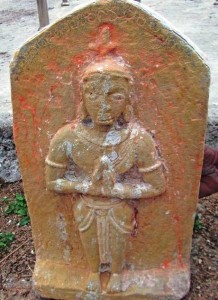
A slab depicts a person with Shivalinga and pitha on his head
Proof of existence of a sect of Shaivism during the Kakatiya rule came to light during a survey and exploratory work conducted by the Archaeological Survey of India in a temple in Mahabubabad district of Telangana recently.
A sculptural slab carved on granite stone illustrating a life-size portrait of a dedicated worshipper of Lord Shiva was discovered in a corner of Sri Agastisvaraswamy temple complex at Abbayapalem village in Maripeda Mandal of the district.
Superintending Archaeologist in Temple Survey Project (Southern Region, ASI) D. Kanna Babu, who is on a mission to explore, ascertain the antiquity and architectural pre-eminence of ancient shrines in Andhra Pradesh and Telangana chanced upon this proof of Lamudigalam — a school of Shaivism prevalent from the 11th C AD to 13th C AD.
The man on the granite slab is seen in vertical position with dignified features and folded hands in worship. The facial features are oval distinguished by wide open eyes and an elongated nose. He wears a dhoti fastened with a broad waist band having a central medallion.
Mr. Kanna Babu says the worshipper sports a beaded necklace, sacred thread, prominent ear rings, arm bands, bracelets and his hair is tied in a circular bun. A small Shivalinga with pitha is adorned by him on his head.
Mr. Kanna Babu told The Hindu, “The discovery of this spectacular portrait sculpture is the first of its kind in the two Telugu States. Unfortunately, a thick coat of colour painted by locals on it during the recent temple festivals had turned it unrecognisable.”
A new school
The uniqueness of the image is that a label inscription in Telugu (from 12th Century AD) is engraved on the top of the sculptural frame and ends at the bottom. The script is self-explanatory: ‘I affectionately adore the linga and placed on my head by tying with my hair.’
The spiritual significance of wearing a Shivalinga on head was considered the most pious act of an ardent devotee of Lord Shiva in the contemporary society of the Kakatiya regime. “The religious connotation of this thematic sculpture is for magnifying the beliefs of the Lamudigalam sect,” the ASI official says.
The prime principle was that one should achieve the state of advaita (non-separation) i.e. there is no difference between Paramatma (Supreme Being) and Jivatma (human being) by practising divine doctrines like Lingadharanam — bearing Shivalinga on his head.
The Agastisvaraswamy temple on the hillock served in those days as the place of worship and the principal seat of this sect finally emerged into Virashaiva aphorism,’ says Kanna Babu who deciphered the inscription.
source: http://www.thehindu.com / The Hindu / Home> News> States> Andhra Pradesh / by Ramesh Susarla Anantapur / November 17th, 2018
17
For her, sweet memory over a bitter dish
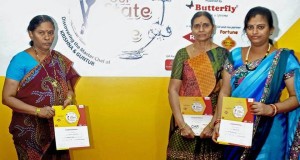
An array of delicious recipes at cookery event
People who eat this vegetable either love it or hate it; there doesn’t seem to be an in-between.
A winning recipe of bitter gourd would remain a sweet memory for a long time to come for M. Prasanna of Chilakaluripet city in Guntur district where The Hindu’s ‘Our State Our Taste’ cookery contest attracted close to 200 enthusiastic participants. The event was organised in association with the Andhra Pradesh Tourism.
Women of all age groups descended on the Prathipati Gardens at Chilakaluripet on Wednesday to showcase their amazing kitchen skills. The kakarakaya-ulli kaaram (stuffed karela) won hands down.
The dish won a cash prize of ₹50,000 for Ms. Prasanna. Korameenu chepala pulusu, a dish prepared by J. Dhana Lakshmi, was adjudged the second best by the jury, fetching a cash prize of ₹30,000 and biryani made with kanda (elephant yam) got the third prize (₹20,000) for N. Prasanna.
Prathipati Venkata Kumari, wife of Minister P. Pullarao, was the chief guest. She went around the tables laden with an array of delicious recipes and tasted some of them. Later, she told the participants it was heart-warming to see such good response in the small town.
The event was powered by Butterfly in association with RKG Ghee and oil and rice partner Fortune. Gift hampers were sponsored by CMR Shopping Mall, Guntur.
source: http://www.thehindu.com / the Hindu / Home> News>Cities> Vijayawada / by Special Correspondent / November 15th, 2018
Literary award for police officer
V Sunil Kumar, Additional DG and Managing Director of AP Police Housing Corporation, was conferred the Sahiti Puraskaram by the Potti Sriramulu University, Hyderabad, for the year 2017.
Mr. Kumar is a prolific writer who has written novels, short stories and poems.
His anthology of short stories Neelaveni , published in 2016 was a run away success.
source: http://www.thehindu.com / The Hindu / Home> National> Andhra Pradesh / Guntur – November 15th, 2018
Four young engineers turn innovators, develop solar electric auto
The vehicle which can travel at a speed of 55 kmph, is on par with commercial autos in the market in many aspects. The maintenance cost of the zero-emission auto is bare minimum.
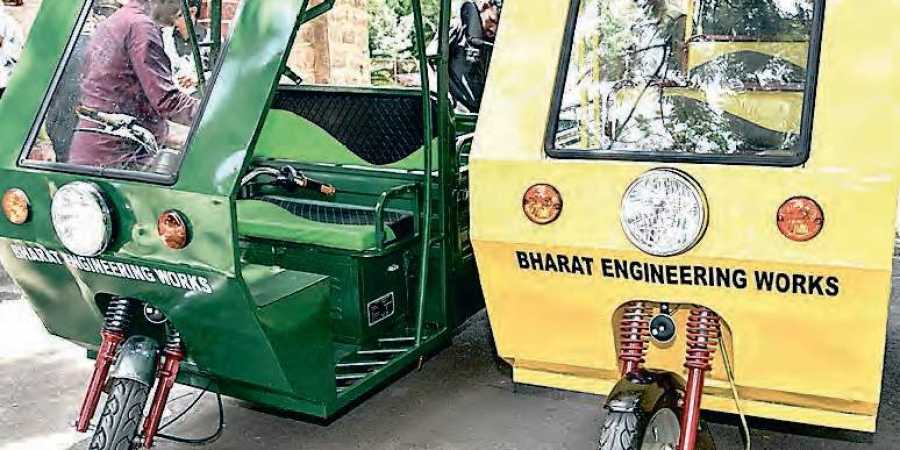
Srikakulam :
Four mechanical engineering graduates have developed a solar electric auto-rickshaw. Instead of opting for jobs in automobile industries after completion of their engineering course, the quartet decided to set up their own automobile unit to be self-reliant. Vavilapalli Uday Kiran, Sasapu Vasudeva Rao, Majji Chanti Babu and Karanam Parthasaradhi launched their pilot project in the name of Vajra Motor Works in Srikakulam a few months ago.
They designed the solar-cum-battery operated auto in just 15 days and launched it in the district on a pilot basis. The quartet claimed that it took only three days for them to make the solar electric auto.
The dual-mode auto runs on solar power in daytime and battery power is used at night. The auto can travel a distance ranging from 110 to 160 km with three-hour charging of battery. It can carry a load of up to one tonne and accommodate seven persons.
The vehicle which can travel at a speed of 55 kmph, is on par with commercial autos in the market in many aspects. The maintenance cost of the zero-emission auto is bare minimum.
Highlighting the salient features of the eco-friendly solar electric auto, Uday Kiran says, “It costs Rs 440 on an average to run a diesel auto for a distance ranging from 110 to 160 km. The operation cost of the solar electric auto for the same distance is not more than Rs 40. If the government extends support to our innovative project, employment can be generated for mechanical engineering graduates in the district. We have already explained our innovative project to the officials concerned seeking the support of the government to expand it.”
source: http://www.newindianexpress.com / The New Indian Express / Home> States> Andhra Pradesh / by G. Ramesh Babu / Express News Service / November 13th, 2018

